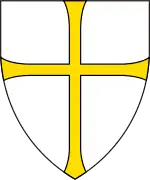Frøya, Trøndelag
Frøya is the westernmost municipality in Trøndelag county, Norway. It is part of the Fosen region and consists of the island of Frøya, which lies north of the island of Hitra, as well several thousand other small islands surrounding the island of Frøya. The village of Sistranda is the administrative center of Frøya. Other villages include Hammarvika, Titran, Sula, and Mausund. The main island of Frøya is connected to the neighboring island of Hitra (and ultimately the mainland of Norway) by the Frøya Tunnel which goes under the Frøyfjorden.[3]
Frøya kommune | |
|---|---|
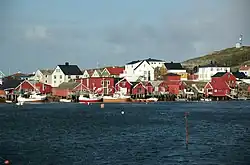 View of the village of Sula | |
 Flag 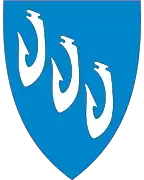 Coat of arms 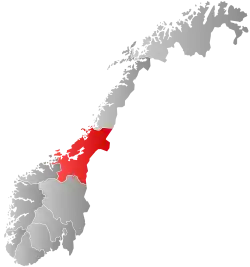 Trøndelag within Norway | |
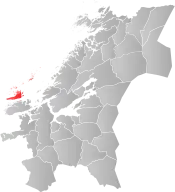 Frøya within Trøndelag | |
| Coordinates: 63°43′32″N 08°44′39″E | |
| Country | Norway |
| County | Trøndelag |
| District | Fosen |
| Established | 1 Jan 1877 |
| • Preceded by | Hitra Municipality |
| Disestablished | 1 Jan 1906 |
| • Succeeded by | Nord-Frøya and Sør-Frøya |
| Re-established | 1 Jan 1964 |
| • Preceded by | Nord-Frøya and Sør-Frøya |
| Administrative centre | Sistranda |
| Government | |
| • Mayor (2019) | Kristin Furunes Strømskag (H) |
| Area | |
| • Total | 241.32 km2 (93.17 sq mi) |
| • Land | 229.93 km2 (88.78 sq mi) |
| • Water | 11.39 km2 (4.40 sq mi) 4.7% |
| • Rank | #291 in Norway |
| Population (2022) | |
| • Total | 5,265 |
| • Rank | #176 in Norway |
| • Density | 22.9/km2 (59/sq mi) |
| • Change (10 years) | |
| Demonym | Frøyværing[1] |
| Official language | |
| • Norwegian form | Bokmål |
| Time zone | UTC+01:00 (CET) |
| • Summer (DST) | UTC+02:00 (CEST) |
| ISO 3166 code | NO-5014 |
| Website | Official website |
The 241-square-kilometre (93 sq mi) municipality is the 291st largest by area out of the 356 municipalities in Norway. Frøya is the 176th most populous municipality in Norway with a population of 5,265. The municipality's population density is 22.9 inhabitants per square kilometre (59/sq mi), and its population has increased by 20.5% over the previous 10-year period.[4][5]
General information
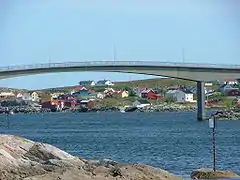
The parish of Frøya was established as a municipality on 1 January 1877 when it was separated from the municipality of Hitra. Its initial population was 3,949. On 1 January 1906, it was split into two municipalities: Nord-Frøya in the north and Sør-Frøya in the south. During the 1960s, there were many municipal mergers across Norway due to the work of the Schei Committee. On 1 January 1964, Nord-Frøya and Sør-Frøya were merged back together again, forming a new municipality of Frøya.[6] On 1 January 2018, the municipality switched from the old Sør-Trøndelag county to the new Trøndelag county.
Name
The name of the island and municipality come from Norse mythology. Although Frøya is a variant of the name of the Norse goddess Freyja, the Old Norse form of the name of the island was Frøy or Frey (the ending -a in the modern form is actually the feminine definite article – so the meaning of Frøya is 'the Frøy'). Therefore, the name of the island probably has the same root as the name of the Norse god Freyr, brother to Freyja. The names originally were titles: "lord" or "lady". The oldest meaning of the common word was "(the one) in front; the foremost, the leading" and here in the sense "the island in front of Hitra". Until 1906 the island and municipality name was spelled Frøien (-en is the masculine definite article in Norwegian).[7]
Coat of arms
The coat of arms was granted on 13 March 1987. The official blazon is "Azure, three fishhooks argent in bend" (Norwegian: I blått tre sølv angler i skrå rekke). This means the arms have a blue field (background) and the charge is a series of three fish hooks lined up diagonally. The fish hooks have a tincture of argent which means it is commonly colored white, but if it is made out of metal, then silver is used. The fish hooks mimic Stone Age hooks made of bone that are meant to symbolize the importance of fishing and trapping by the people of Frøya. The arms were designed by Einar H. Skjervold based on an idea by S. Hogstad from Kolsås.[3][8][9][10]
Churches
The Church of Norway has one parish (sokn) within the municipality of Frøya. It is part of the Orkdal prosti (deanery) in the Diocese of Nidaros.
| Parish (sokn) | Church name | Location of the church | Year built |
|---|---|---|---|
| Frøya | Sletta Church | Nord-Frøya (Berge) | 1990 |
| Hallaren Church | Storhallaren | 1881 | |
| Froan Chapel | Froan (Sauøya) | 1904 | |
| Måøy Chapel | Mausund (Måøya) | 1939 | |
| Sula Chapel | Sula | 1925 | |
| Titran Chapel | Titran | 1873 |
Government
All municipalities in Norway, including Frøya, are responsible for primary education (through 10th grade), outpatient health services, senior citizen services, unemployment and other social services, zoning, economic development, and municipal roads. The municipality is governed by a municipal council of elected representatives, which in turn elect a mayor.[11] The municipality falls under the Trøndelag District Court and the Frostating Court of Appeal.
Municipal council
The municipal council (Kommunestyre) of Frøya is made up of 23 representatives that are elected to four year terms. The party breakdown of the council is as follows:
| Party Name (in Norwegian) | Number of representatives | |
|---|---|---|
| Labour Party (Arbeiderpartiet) | 7 | |
| Progress Party (Fremskrittspartiet) | 2 | |
| Conservative Party (Høyre) | 3 | |
| Pensioners' Party (Pensjonistpartiet) | 1 | |
| Red Party (Rødt) | 2 | |
| Centre Party (Senterpartiet) | 5 | |
| Socialist Left Party (Sosialistisk Venstreparti) | 1 | |
| Liberal Party (Venstre) | 2 | |
| Total number of members: | 23 | |
| Party Name (in Norwegian) | Number of representatives | |
|---|---|---|
| Labour Party (Arbeiderpartiet) | 12 | |
| Progress Party (Fremskrittspartiet) | 3 | |
| Conservative Party (Høyre) | 2 | |
| Centre Party (Senterpartiet) | 1 | |
| Socialist Left Party (Sosialistisk Venstreparti) | 1 | |
| Liberal Party (Venstre) | 4 | |
| Total number of members: | 23 | |
| Party Name (in Norwegian) | Number of representatives | |
|---|---|---|
| Labour Party (Arbeiderpartiet) | 10 | |
| Progress Party (Fremskrittspartiet) | 5 | |
| Conservative Party (Høyre) | 2 | |
| Centre Party (Senterpartiet) | 1 | |
| Socialist Left Party (Sosialistisk Venstreparti) | 1 | |
| Liberal Party (Venstre) | 4 | |
| Total number of members: | 23 | |
| Party Name (in Norwegian) | Number of representatives | |
|---|---|---|
| Labour Party (Arbeiderpartiet) | 7 | |
| Progress Party (Fremskrittspartiet) | 5 | |
| Conservative Party (Høyre) | 2 | |
| Christian Democratic Party (Kristelig Folkeparti) | 1 | |
| Centre Party (Senterpartiet) | 1 | |
| Socialist Left Party (Sosialistisk Venstreparti) | 2 | |
| Liberal Party (Venstre) | 5 | |
| Total number of members: | 23 | |
| Party Name (in Norwegian) | Number of representatives | |
|---|---|---|
| Labour Party (Arbeiderpartiet) | 7 | |
| Progress Party (Fremskrittspartiet) | 3 | |
| Conservative Party (Høyre) | 3 | |
| Christian Democratic Party (Kristelig Folkeparti) | 2 | |
| Centre Party (Senterpartiet) | 2 | |
| Socialist Left Party (Sosialistisk Venstreparti) | 2 | |
| Liberal Party (Venstre) | 4 | |
| Total number of members: | 23 | |
| Party Name (in Norwegian) | Number of representatives | |
|---|---|---|
| Labour Party (Arbeiderpartiet) | 11 | |
| Progress Party (Fremskrittspartiet) | 1 | |
| Conservative Party (Høyre) | 4 | |
| Christian Democratic Party (Kristelig Folkeparti) | 2 | |
| Centre Party (Senterpartiet) | 2 | |
| Socialist Left Party (Sosialistisk Venstreparti) | 1 | |
| Liberal Party (Venstre) | 2 | |
| Total number of members: | 23 | |
| Party Name (in Norwegian) | Number of representatives | |
|---|---|---|
| Labour Party (Arbeiderpartiet) | 16 | |
| Progress Party (Fremskrittspartiet) | 1 | |
| Conservative Party (Høyre) | 3 | |
| Christian Democratic Party (Kristelig Folkeparti) | 2 | |
| Centre Party (Senterpartiet) | 3 | |
| Socialist Left Party (Sosialistisk Venstreparti) | 2 | |
| Liberal Party (Venstre) | 2 | |
| Total number of members: | 29 | |
| Party Name (in Norwegian) | Number of representatives | |
|---|---|---|
| Labour Party (Arbeiderpartiet) | 15 | |
| Progress Party (Fremskrittspartiet) | 1 | |
| Conservative Party (Høyre) | 3 | |
| Christian Democratic Party (Kristelig Folkeparti) | 2 | |
| Centre Party (Senterpartiet) | 3 | |
| Socialist Left Party (Sosialistisk Venstreparti) | 2 | |
| Liberal Party (Venstre) | 1 | |
| Joint list of the Pensioners' Party and the Pensioner and insured list (Pensjonistpartiet, Pensjonister og Trygdedes liste) | 2 | |
| Total number of members: | 29 | |
| Party Name (in Norwegian) | Number of representatives | |
|---|---|---|
| Labour Party (Arbeiderpartiet) | 12 | |
| Conservative Party (Høyre) | 4 | |
| Christian Democratic Party (Kristelig Folkeparti) | 4 | |
| Pensioners' Party (Pensjonistpartiet) | 2 | |
| Centre Party (Senterpartiet) | 3 | |
| Socialist Left Party (Sosialistisk Venstreparti) | 1 | |
| Liberal Party (Venstre) | 3 | |
| Total number of members: | 29 | |
| Party Name (in Norwegian) | Number of representatives | |
|---|---|---|
| Labour Party (Arbeiderpartiet) | 13 | |
| Conservative Party (Høyre) | 5 | |
| Christian Democratic Party (Kristelig Folkeparti) | 6 | |
| Centre Party (Senterpartiet) | 4 | |
| Socialist Left Party (Sosialistisk Venstreparti) | 1 | |
| Liberal Party (Venstre) | 4 | |
| Total number of members: | 33 | |
| Party Name (in Norwegian) | Number of representatives | |
|---|---|---|
| Labour Party (Arbeiderpartiet) | 10 | |
| Conservative Party (Høyre) | 5 | |
| Christian Democratic Party (Kristelig Folkeparti) | 4 | |
| Centre Party (Senterpartiet) | 5 | |
| Liberal Party (Venstre) | 4 | |
| Non-party list (Upolitisk liste) | 5 | |
| Total number of members: | 33 | |
| Party Name (in Norwegian) | Number of representatives | |
|---|---|---|
| Labour Party (Arbeiderpartiet) | 15 | |
| Conservative Party (Høyre) | 4 | |
| Christian Democratic Party (Kristelig Folkeparti) | 7 | |
| Centre Party (Senterpartiet) | 7 | |
| Socialist Left Party (Sosialistisk Venstreparti) | 1 | |
| Liberal Party (Venstre) | 3 | |
| Total number of members: | 37 | |
| Party Name (in Norwegian) | Number of representatives | |
|---|---|---|
| Labour Party (Arbeiderpartiet) | 19 | |
| Conservative Party (Høyre) | 5 | |
| Christian Democratic Party (Kristelig Folkeparti) | 5 | |
| Centre Party (Senterpartiet) | 3 | |
| Socialist People's Party (Sosialistisk Folkeparti) | 1 | |
| Liberal Party (Venstre) | 4 | |
| Total number of members: | 37 | |
| Party Name (in Norwegian) | Number of representatives | |
|---|---|---|
| Labour Party (Arbeiderpartiet) | 17 | |
| Conservative Party (Høyre) | 6 | |
| Christian Democratic Party (Kristelig Folkeparti) | 5 | |
| Socialist People's Party (Sosialistisk Folkeparti) | 1 | |
| Liberal Party (Venstre) | 6 | |
| Local List(s) (Lokale lister) | 2 | |
| Total number of members: | 37 | |
| Party Name (in Norwegian) | Number of representatives | |
|---|---|---|
| Labour Party (Arbeiderpartiet) | 18 | |
| Conservative Party (Høyre) | 7 | |
| Christian Democratic Party (Kristelig Folkeparti) | 6 | |
| Liberal Party (Venstre) | 6 | |
| Total number of members: | 37 | |
Mayor
The mayors of Frøya:[24]
- 1877–1885: Lars M. Eggen (H)
- 1886–1887: Martin Sivertsen (V)
- 1888–1889: Ivar Meland (V)
- 1890–1893: Martin Sivertsen (V)
- 1894–1897: Anton J. Leirvik (V)
- 1898-1898: Martin Sivertsen (V)
- 1899–1901: Kristian Sletvold (V)
- 1902–1905: Martin Sivertsen (V)
(Municipality doesn't exist from 1905-1964)
- 1964–1967: Johan Rabben (H)
- 1968–1971: Georg Larsen (V)
- 1972–1975: Oskar Steinvik (Ap)
- 1975-1975: Asbjørn Waagø (Ap)
- 1976–1979: Jan Iversen (KrF)
- 1979-1987: Sigbjørn Larsen (KrF)
- 1987-2003: Jan Otto Fredagsvik (Ap)
- 2003-2007: Arvid Hammernes (V)
- 2007-2011: Hans Stølan (Ap)
- 2011-2019: Berit Flåmo (Ap)
- 2019–present: Kristin Furunes Strømskag (H)
Geography
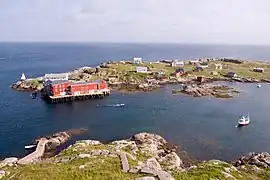
The municipality of Frøya has many small fishing communities on the large island of Frøya and many small islands in the ocean such as Mausundvær, Bogøyvær, and Sula, with Mausund being the largest of these with a population of approximately 270. Other small islands such as Froan and Halten, Trøndelag lay to the northeast of the island of Frøya. Many of these islands are home to lighthouses such as Halten Lighthouse, Finnvær Lighthouse, Vingleia Lighthouse, Sula Lighthouse, and Sletringen Lighthouse.
The main island of Frøya is fairly open and has no natural forests–mostly covered with marshes and heather. The largest villages on the island are Sistranda in the east and Titran in the west. Frøya is a member of the International Island Games Association. The highest point above sea level is the 76-metre (249 ft) tall Besselvassheia, and the second highest point is the 74-metre (243 ft) tall Bremnestua.[25]
Climate
Frøya has a temperate oceanic climate (Cfb) with a year amplitude of only 11.2 °C (20 °F) from the coldest to the warmest month. November and December are the wettest months, while April – July are the driest part of the year. The record high is from July 2014, and the record low is from February 2010. The average date for the last overnight freeze (below 0 °C (32.0 °F)) in spring is 4 April[26] and average date for first freeze in autumn is 20 November (1981-2010 average)[27] giving an average frost-free season of 229 days.
| Climate data for Sula, Frøya 1991-2020 (5 m, extremes 1975-2023) | |||||||||||||
|---|---|---|---|---|---|---|---|---|---|---|---|---|---|
| Month | Jan | Feb | Mar | Apr | May | Jun | Jul | Aug | Sep | Oct | Nov | Dec | Year |
| Record high °C (°F) | 10.3 (50.5) |
9.9 (49.8) |
12.6 (54.7) |
19.3 (66.7) |
22.3 (72.1) |
27.7 (81.9) |
28.3 (82.9) |
26.3 (79.3) |
22.7 (72.9) |
18.8 (65.8) |
14.6 (58.3) |
11.1 (52.0) |
28.3 (82.9) |
| Average high °C (°F) | 4.6 (40.3) |
4.2 (39.6) |
5.2 (41.4) |
7.6 (45.7) |
10.4 (50.7) |
13 (55) |
15.6 (60.1) |
16.1 (61.0) |
13.8 (56.8) |
9.8 (49.6) |
6.9 (44.4) |
5.5 (41.9) |
9.4 (48.9) |
| Daily mean °C (°F) | 3.1 (37.6) |
2.5 (36.5) |
3.2 (37.8) |
5.4 (41.7) |
8 (46) |
10.7 (51.3) |
13 (55) |
13.7 (56.7) |
11.8 (53.2) |
8.3 (46.9) |
5.5 (41.9) |
3.8 (38.8) |
7.4 (45.3) |
| Average low °C (°F) | 1.2 (34.2) |
0.9 (33.6) |
1.6 (34.9) |
3.5 (38.3) |
6 (43) |
8.9 (48.0) |
11.3 (52.3) |
12.2 (54.0) |
10.2 (50.4) |
6.6 (43.9) |
3.7 (38.7) |
2.1 (35.8) |
5.7 (42.3) |
| Record low °C (°F) | −12.3 (9.9) |
−12.7 (9.1) |
−8.1 (17.4) |
−3.6 (25.5) |
−0.3 (31.5) |
2.7 (36.9) |
5 (41) |
7.1 (44.8) |
2 (36) |
−1.1 (30.0) |
−7 (19) |
−10.9 (12.4) |
−12.7 (9.1) |
| Average precipitation mm (inches) | 92 (3.6) |
75 (3.0) |
80 (3.1) |
55 (2.2) |
46 (1.8) |
53 (2.1) |
57 (2.2) |
74 (2.9) |
104 (4.1) |
88 (3.5) |
108 (4.3) |
113 (4.4) |
945 (37.2) |
| Source 1: Norwegian Meteorological Institute[28] | |||||||||||||
| Source 2: NOAA-WMO averages 91-2020 Norway [29] | |||||||||||||
Notable residents
- John A. Widtsoe (1872 in Frøya – 1952) a Norwegian American, LDS churchman, author, scientist and academic
- Paul Martin Dahlø (1885 in Frøya – 1967) a Norwegian fisherman and politician, Mayor of Frøya before and after World War II
- Alf Tande-Petersen (born 1950) a Norwegian TV personality, journalist, writer and businessperson; brought up in Frøya
- Gustav Magnar Witzøe (born 1993 in Frøya) a billionaire and shareholder of salmon fish farming company SalMar ASA
References
- "Navn på steder og personer: Innbyggjarnamn" (in Norwegian). Språkrådet.
- "Forskrift om målvedtak i kommunar og fylkeskommunar" (in Norwegian). Lovdata.no.
- Haugen, Morten, ed. (12 September 2017). "Frøya – kommune". Store norske leksikon (in Norwegian). Kunnskapsforlaget. Retrieved 2 October 2017.
- Statistisk sentralbyrå. "Table: 06913: Population 1 January and population changes during the calendar year (M)" (in Norwegian).
- Statistisk sentralbyrå. "09280: Area of land and fresh water (km²) (M)" (in Norwegian).
- Jukvam, Dag (1999). "Historisk oversikt over endringer i kommune- og fylkesinndelingen" (PDF) (in Norwegian). Statistisk sentralbyrå.
- Rygh, Oluf (1901). Norske gaardnavne: Søndre Trondhjems amt (in Norwegian) (14 ed.). Kristiania, Norge: W. C. Fabritius & sønners bogtrikkeri. p. 55.
- "Civic heraldry of Norway – Norske Kommunevåpen". Heraldry of the World. Retrieved 6 February 2023.
- "Froya, South Trøndelag". Flags of the World. Retrieved 6 February 2023.
- "Godkjenning av våpen og flagg". Lovdata.no (in Norwegian). Norges kommunal- og arbeidsdepartementet. 13 March 1987. Retrieved 6 February 2023.
- Hansen, Tore, ed. (12 May 2016). "kommunestyre". Store norske leksikon (in Norwegian). Kunnskapsforlaget. Retrieved 1 January 2019.
- "Tall for Norge: Kommunestyrevalg 2019 – Trøndelag". Valg Direktoratet. Retrieved 19 October 2019.
- "Table: 04813: Members of the local councils, by party/electoral list at the Municipal Council election (M)" (in Norwegian). Statistics Norway.
- "Tall for Norge: Kommunestyrevalg 2011 – Sør-Trøndelag". Valg Direktoratet. Retrieved 19 October 2019.
- "Kommunestyrevalget 1995" (PDF) (in Norwegian). Oslo-Kongsvinger: Statistisk sentralbyrå. 1996. Retrieved 12 April 2020.
- "Kommunestyrevalget 1991" (PDF) (in Norwegian). Oslo-Kongsvinger: Statistisk sentralbyrå. 1993. Retrieved 12 April 2020.
- "Kommunestyrevalget 1987" (PDF) (in Norwegian). Oslo-Kongsvinger: Statistisk sentralbyrå. 1988. Retrieved 12 April 2020.
- "Kommunestyrevalget 1983" (PDF) (in Norwegian). Oslo-Kongsvinger: Statistisk sentralbyrå. 1984. Retrieved 12 April 2020.
- "Kommunestyrevalget 1979" (PDF) (in Norwegian). Oslo: Statistisk sentralbyrå. 1979. Retrieved 12 April 2020.
- "Kommunevalgene 1975" (PDF) (in Norwegian). Oslo: Statistisk sentralbyrå. 1977. Retrieved 12 April 2020.
- "Kommunevalgene 1972" (PDF) (in Norwegian). Oslo: Statistisk sentralbyrå. 1973. Retrieved 12 April 2020.
- "Kommunevalgene 1967" (PDF) (in Norwegian). Oslo: Statistisk sentralbyrå. 1967. Retrieved 12 April 2020.
- "Kommunevalgene 1963" (PDF) (in Norwegian). Oslo: Statistisk sentralbyrå. 1964. Retrieved 12 April 2020.
- Festskrift: kommunalt selvstyre i Sør-Trøndelag 150 år : 1837-1987 (in Norwegian). Trondheim: Strindheim trykkeris forl. 1987. p. 176. ISBN 8290551126.
- "Frøya – The islands against the big ocean!". trondelagskysten.no. Archived from the original on 24 July 2011. Retrieved 17 November 2010.
- "Siste frostnatt om våren". NRK. 4 May 2012. Retrieved 14 April 2023.
- Husebø, Trond-Ole (25 September 2013). "Første frostnatt". NRK. Retrieved 14 April 2023.
- "Norwegian Meteorological Institute".
- "NOAA WMO normals Norway 1991-2020".
External links
 Trøndelag travel guide from Wikivoyage
Trøndelag travel guide from Wikivoyage- Municipal fact sheet from Statistics Norway (in Norwegian)

